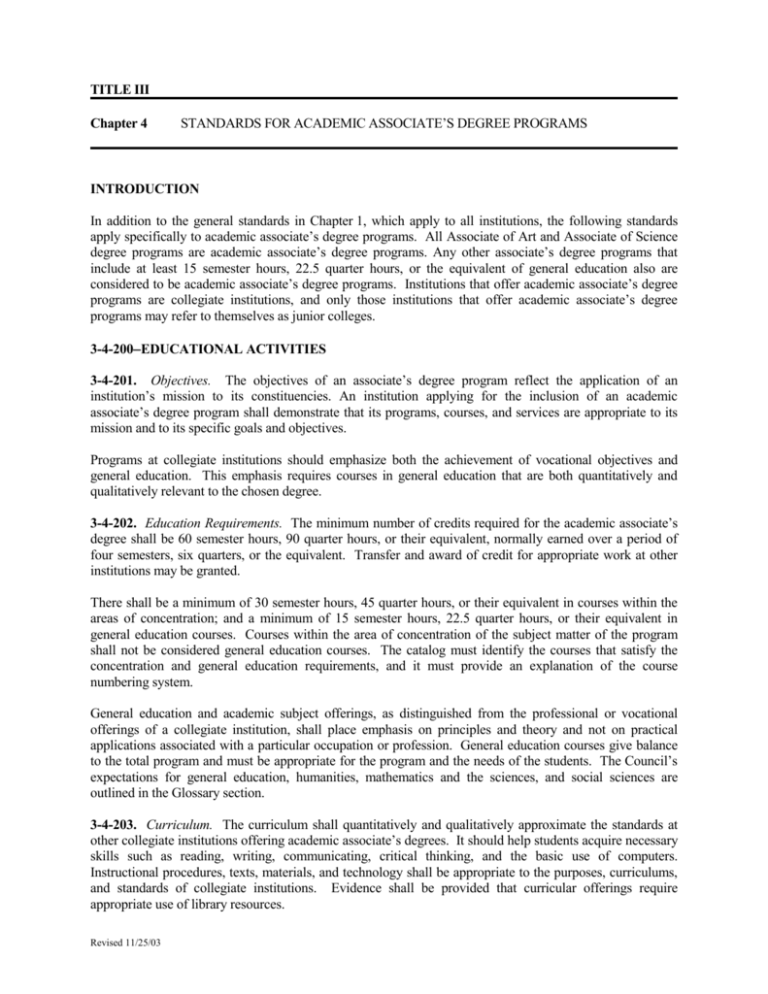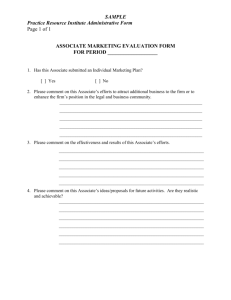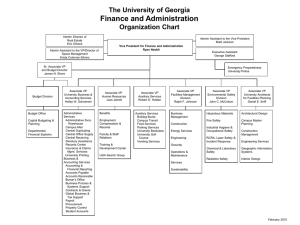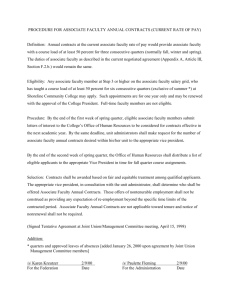Standards for Academic Associate`s Degree Programs
advertisement

TITLE III Chapter 4 STANDARDS FOR ACADEMIC ASSOCIATE’S DEGREE PROGRAMS INTRODUCTION In addition to the general standards in Chapter 1, which apply to all institutions, the following standards apply specifically to academic associate’s degree programs. All Associate of Art and Associate of Science degree programs are academic associate’s degree programs. Any other associate’s degree programs that include at least 15 semester hours, 22.5 quarter hours, or the equivalent of general education also are considered to be academic associate’s degree programs. Institutions that offer academic associate’s degree programs are collegiate institutions, and only those institutions that offer academic associate’s degree programs may refer to themselves as junior colleges. 3-4-200EDUCATIONAL ACTIVITIES 3-4-201. Objectives. The objectives of an associate’s degree program reflect the application of an institution’s mission to its constituencies. An institution applying for the inclusion of an academic associate’s degree program shall demonstrate that its programs, courses, and services are appropriate to its mission and to its specific goals and objectives. Programs at collegiate institutions should emphasize both the achievement of vocational objectives and general education. This emphasis requires courses in general education that are both quantitatively and qualitatively relevant to the chosen degree. 3-4-202. Education Requirements. The minimum number of credits required for the academic associate’s degree shall be 60 semester hours, 90 quarter hours, or their equivalent, normally earned over a period of four semesters, six quarters, or the equivalent. Transfer and award of credit for appropriate work at other institutions may be granted. There shall be a minimum of 30 semester hours, 45 quarter hours, or their equivalent in courses within the areas of concentration; and a minimum of 15 semester hours, 22.5 quarter hours, or their equivalent in general education courses. Courses within the area of concentration of the subject matter of the program shall not be considered general education courses. The catalog must identify the courses that satisfy the concentration and general education requirements, and it must provide an explanation of the course numbering system. General education and academic subject offerings, as distinguished from the professional or vocational offerings of a collegiate institution, shall place emphasis on principles and theory and not on practical applications associated with a particular occupation or profession. General education courses give balance to the total program and must be appropriate for the program and the needs of the students. The Council’s expectations for general education, humanities, mathematics and the sciences, and social sciences are outlined in the Glossary section. 3-4-203. Curriculum. The curriculum shall quantitatively and qualitatively approximate the standards at other collegiate institutions offering academic associate’s degrees. It should help students acquire necessary skills such as reading, writing, communicating, critical thinking, and the basic use of computers. Instructional procedures, texts, materials, and technology shall be appropriate to the purposes, curriculums, and standards of collegiate institutions. Evidence shall be provided that curricular offerings require appropriate use of library resources. Revised 11/25/03









